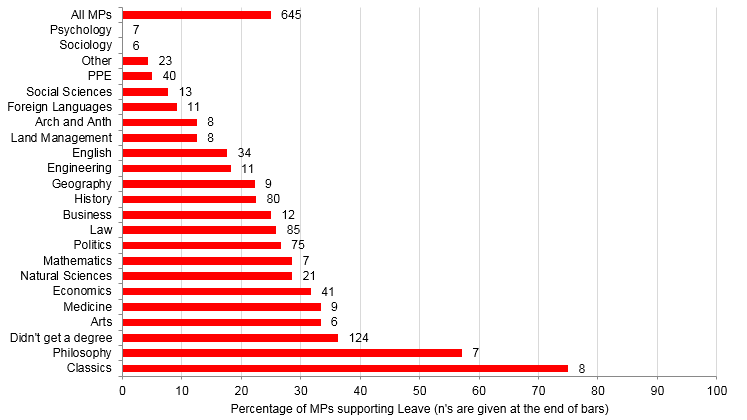

Since the referendum, there has been much speculation about the relationship between MPs’ undergraduate degree subjects and their stance in the Brexit referendum. Yuan Yi Zhu (Oxford) and Noah Carl (Cambridge) observe that MPs who studied PPE (Philosophy, Politics and Economics) at university are among the most pro-Remain.
Are PPE graduates ruining Britain? In recent years, the ever-popular degree, which has produced a disproportionate number of senior British politicians, has come under criticism from all sides of the political spectrum. On the Left, the journalist Nick Cohen (himself a PPE graduate) argues that the degree’s design encourages superficial thinking, producing “world-class bullshitters”, and “the largest single component of the most despised generation of politicians since the Great Reform Act”. On the Right, the polemicist James Delingpole wrote, scarcely less colourfully, that “all the worst Remainers read PPE at Oxford”. PPE is not the only degree that has been linked to MPs’ stances on Brexit. Writing in The Spectator, Greg Hall notes that many leading Brexiteers read History at university, while several leading Remainers studied Law. However, all these claims are based on selected samples of just a few prominent MPs, whereas there are 650 seats in the House of Commons. Do MPs’ educational backgrounds matter when one considers the House in its totality?
Academic literature on the topic is rather scarce. In a 2015 study, Mark Goodwin found no link between possessing a scientific training and voting behaviour on the science-heavy Human Fertilisation and Embryology Bill 2008 (a result which somewhat undercuts calls to increase the number of scientist MPs as a way to improve decision-making). On the other hand, educational attainment is closely associated with social class, and there is evidence that MPs’ class backgrounds do affect their policy positions. But as far as we are aware, there has been no systematic investigation of how MPs’ degree subjects relate to their policy stances, despite the widespread assumption (as shown by the case of the PPE) that the two might indeed be linked.
To test this assumption, we examined whether there was any relationship between MPs’ higher education background and their public stance on Brexit prior to the referendum. We assembled educational data on every MP in the Commons at the time of the referendum, using public domain sources such as Wikipedia, Who’s Who and Dod’s, as well as MPs’ personal websites. For the sake of consistency, only undergraduate degrees and above, and only completed degrees, were included. MPs’ pre-referendum stances on Brexit were taken from the list compiled by the BBC, and then supplemented with the list compiled by Guido Fawkes. Given the perceived dominance of Oxbridge over public life, we also coded whether an MP ever attended one of the two ancient universities. And considering the importance of nationalism versus cosmopolitanism in the debate over Brexit, we coded whether an MP obtained any degrees from a foreign university. Finally, we recorded MPs’ age, gender, ethnicity, and political party.

What did we find? Overall, 75% of MPs supported Remain, while 25% backed Leave. Consistent with the pattern in the general population, MPs who did not complete a university degree were somewhat more likely to support Leave (38%) than those who possess an undergraduate degree or above (22%). Interestingly, however, MPs who hold a master’s or PhD were not substantially more likely to back Remain (19%) than those who only possess an undergraduate degree (23%).
When it came to MPs’ degree subjects, our results were rather interesting. The chart below shows the percentage of MPs supporting Leave, broken down by undergraduate degree subject. The figure at the end of each bar corresponds to the absolute number of MPs who studied the subject in question (e.g., 7 studied Psychology). At one end of the spectrum, 75% of those who read Classics supported Leave (although it should be noted that were only 8 Classicists in the sample). At the other end of the spectrum, none of those who studied Psychology or Sociology backed Leave. Despite the fact that PPE has come in for some abuse from Remainers such as Sir Ivan Rogers, PPE graduates heavily backed Remain, with a mere 5% declaring their support for Leave. And contrary to the trend Greg Hall detected among leading Brexiteers, only 22% of Historians supported Leave, which was close to the sample average.

Although one could object to calculating significance levels for these differences on the grounds that our dataset comprises the full population of MPs, we have provided them anyway in a supplementary file, along with our data and Stata code. (As it turns out, when we use Classics as the reference category, most other subjects do have a significant negative ‘effect’ on support for Leave. Most of these effects become smaller, and some are rendered non-significant, when we include MPs’ age, gender, ethnicity and political party in the model.)
What about MPs that went to Oxford or Cambridge? The two ancient universities are often criticized, depending on one’s ideological leanings, as being biased to either the Left or the Right. Both cities voted heavily for Remain in the referendum, and Brexit-backing students there reported being shunned by their peers. Overall, however, MPs with an Oxbridge education were only slightly (and non-significantly) more likely to support Remain. When we controlled for MPs’ political party, however, the difference increased from 4 percentage points to 13 percentage points (and reached a high level of statistical significance). This is because Conservative MPs were both more likely to have an Oxbridge education and more likely to back Leave. Finally, possession of a degree from a foreign university had only a small (and non-significant) effect on MPs’ Brexit support (with the caveat that only 26 MPs within the sample possessed one).
In conclusion, the distribution of support for Leave versus Remain was not uniform across MPs’ undergraduate degree subjects: Classicists were the most pro-Leave, while Psychologists, Sociologists and PPE graduates were the most pro-Remain. It is perhaps noteworthy that the four most pro-Remain subjects were all social sciences (although note that economists were slightly more pro-Leave than the sample average). An important qualifier is that our results are of course purely associational. While it could be that studying PPE actually makes you more pro-Remain, it is equally possible that those with a pro-Remain disposition were simply more likely to choose the subject at university. But whatever the truths surrounding this issue, the British public’s fascination with their representatives’ educational backgrounds is unlikely to abate anytime soon.
This post represents the views of the author and not those of the Brexit blog, nor the LSE.
Yuan Yi Zhu is a DPhil candidate in International Relations at Nuffield College, Oxford.
Noah Carl is a post-doctoral research fellow at St Edmund’s College, Cambridge.







“the degree’s design encourages superficial thinking, producing “world-class bullshitters”,
A great expression which sums up a very large proportion of current politicians. The only words missing from it are “self serving and dishonest”.
Interesting, though unlikely to excite the analytical synapses in the statistician brains. One surprise, from my view, is the propensity for historians to favour remain. One would have thought, they who have studied history would know where and how the EU project as envisioned and executed will end up. The dustbin of history is replete with such examples. Maybe, however, the EU project is not as it is generally made out to be. There are any number of scenarios possible once one stops believing what is officially and through the MSM put about with regards to the future, i.e., the federalisation, of the EU.
For all I know, the project might be a smash and grab exercise to capture a revenue stream and cream off money supply and whatever else international high finance does.
Another comment I would offer is the mystery about philosophy. Psychology and sociology were made mention of, but not philosophy proper. Not that I think academics will accept my interpretation of philosophy as a field of study, but I see no evidence from that quarter that wisdom is truly loved, quite the contrary, actually. Then, neither psychology and sociology, academically speaking, have anything to do with philosophy, but are politically based and economically driven. That, however, would be only the beginning of the politically strategic sleights of hand operating in the Western academic field of operations.
Lastly, for now, possibly PPE graduates, a bit more than other graduates, may be more inclined to support the cause which they expect to offer them better career prospects.
The graph of degree subjects is interesting. My impression is that the subjects in the first half (so, the MPs who tended more to be Remainers) are usually new subjects, in the sense that it would not have been possible or easy to study them in the UK as a degree 100 years ago. The subjects in the second half (MPs tending more to be Remainers) are older subjects. According to Wikipedia, PPE started being offered at Oxford in the 1920s, so fits this hypothesis, just.
I appreciate that this is not a scientific observation. In particular I don’t know how exactly to define “possible or easy to study as a degree” and I don’t know where I can find historical data. I assume that, for example, you could study for an economics degree at the LSE or for an arts degree at the Slade 100 years ago. But it would be interesting to get exact data and see if my observation is backed by the numbers.
Of course, it is likely enough that the effect is confounded once you control for Tory or Labour.
WTF? You call this analysis?
Let’s take the first sentence : “Are PPE graduates ruining Britain?” “Ruin” in what way? The article goes on to demonstrate that these graduates are most likely to have voted Remain. So the very first sentence implies that to vote Remain is to “ruin the country”. Do you see the problem right there, with this piece of “analysis”?
The authors proudly display their own Oxbridge credentials. I think that is the most telling thing about this piece.